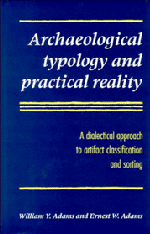 Archaeological Typology and Practical Reality
Archaeological Typology and Practical Reality Published online by Cambridge University Press: 23 November 2009
In recent years there has been a trend toward employing mathematical information theory to formulate ideas about information in the fields of classification (Duncan and Estabrook 1976; Voss, Estabrook, and Voss 1983), philosophy of science (Rosenkrantz 1977), and even in the theory of knowledge (Dretske 1981). A similar application could be especially appropriate here, where we are concerned with informative typologies, because the concise expression that it gives to otherwise vague intuitions may allow us to see implications and connections between them that are not otherwise apparent.
Perhaps the most important intuition, to begin with, is that typologies like the Nubian Pottery Typology are developed primarily so that they will yield data that are useful for estimation, which means that the typologies are informative about those things that they are designed to estimate. Related theses are that the attributes, in terms of which the types are described, are informative about the types (with diagnostic attributes being the most informative), and that objectivity is useful to the extent that estimates based on objective data are better than estimates that are subjectively based.
The present chapter will sketch a way of formulating the above and other, related ideas information-theoretically. Our approach adapts to the typological case, and to the Nubian Pottery Typology in particular, certain methods that were earlier applied by EWA (1966) to quantitative measurement. This involves the application of information-theoretic concepts to typological propositions, expressed in the language of formal logic.
To save this book to your Kindle, first ensure [email protected] is added to your Approved Personal Document E-mail List under your Personal Document Settings on the Manage Your Content and Devices page of your Amazon account. Then enter the ‘name’ part of your Kindle email address below. Find out more about saving to your Kindle.
Note you can select to save to either the @free.kindle.com or @kindle.com variations. ‘@free.kindle.com’ emails are free but can only be saved to your device when it is connected to wi-fi. ‘@kindle.com’ emails can be delivered even when you are not connected to wi-fi, but note that service fees apply.
Find out more about the Kindle Personal Document Service.
To save content items to your account, please confirm that you agree to abide by our usage policies. If this is the first time you use this feature, you will be asked to authorise Cambridge Core to connect with your account. Find out more about saving content to Dropbox.
To save content items to your account, please confirm that you agree to abide by our usage policies. If this is the first time you use this feature, you will be asked to authorise Cambridge Core to connect with your account. Find out more about saving content to Google Drive.